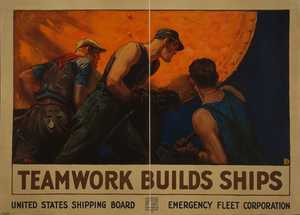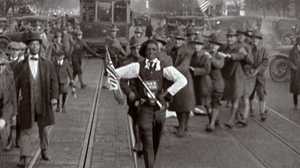The World’s Experience
After fighting for democracy overseas in World War I, African American soldiers returned determined to fight for democracy at home
By Adriane Lentz-Smith

Like many American soldiers who served in the Great War, Sergeant Christopher Columbus Watts had gained a sense of his own heroism. As a member of the all-black 369th Infantry regiment, he had seen action on the front in Champagne and had been rewarded with medals from the French and from the city of Norfolk. Also like many of his comrades, he carried physical reminders of the fight; he had been gassed in the Argonne forest and, in a questionnaire for the Virginia War History Commission in 1920, described himself as “partly disabled” as a result of his injuries.
But on the final page of that same survey, when asked “What were the effects upon yourself” of service overseas, Watts describes something less tangible. Military service had carried the farmer and dockworker from Portsmouth, Virginia, on the edge of the Chesapeake Bay, to St. Nazaire, France, on the coast of the Atlantic Ocean. His unit, known and celebrated as the Harlem Hellfighters, had been comprised of black men hailing from places as far ranging as New York to Puerto Rico — and they had been placed within the French Army, trained and incorporated with French soldiers. Watts had traveled across France, mixed with French people, fought alongside troops from France’s multi-racial empire. Looking out from Portsmouth, one might suspect that the world was bigger than Virginia, less bounded than the U.S. South. But on French soil, in the French Army, one knew it. And so Sergeant Watts, named for Christopher Columbus himself, summed up the effect of his time abroad in a single line: “I have the world’s experience.”[1]

Military service brought the world to bear on the lives of the nearly 390,000 African Americans who served during the First World War, and on the broader black community who pinned their hopes on black soldiers. Whether they remained stateside or sailed abroad with the American Expeditionary Forces (AEF), black soldiers found themselves caught up in a global drama with substantial domestic ramifications. As early as 1915, scholar and activist W. E. B. Du Bois explained how imperial rivalries — so bound up in racialized power and resource extraction — had supplied “the roots, not simply of war today but of the menace of wars tomorrow.” [2] Yet until mobilization began in the United States, most African Americans saw little connection between Europe’s war and the system of racialized power and economic exploitation that governed their lives. That system, known colloquially as “Jim Crow” and championed by its defenders in state and federal government as “white supremacy,” had flourished in the opening years of the twentieth century and grown even stronger as its architects took positions of power in the Wilson administration. When President Wilson urged the nation into a war to make the world, he said, at last free, he inadvertently supplied language and leverage to challenge Jim Crow’s ascent, and bring the American black freedom struggle to the world stage.
Proponents of Jim Crow and defenders of African American rights fought a war over democracy at home in the midst of the Great War. African Americans saw the war as an opportunity to remind their fellow Americans that black folks had not only built the nation, they had sacrificed for its defense ever since Crispus Attucks fell in the Boston Massacre almost 150 years before. Service abroad would extend that sacrifice. Some 200,000 African Americans went to Europe with the AEF, 40,000 of them as combat troops. Their letters home capture both the courage and trauma involved in modern warfare as well as the pain and disillusion of realizing that their fellow soldiers were as invested in policing the color line as they were in fighting Germany. They sent word of soldiers assaulted for talking to French women, officers demoted because their white superiors opposed having black men in command, labor battalions threatened with the Klan’s vengeance if they forgot their place. At the same time, word came back to them of the rise in lynchings on the home front — from at least 36 in 1917 to at minimum 60 in 1918 — often public and gruesome. If the hostility of the military leadership did not clue African Americans into the limited scope of this war for democracy, then white racial terrorism drove the point home.

Yet African Americans would not concede the point. By their ken, the explosion of racist terror also signaled that Jim Crow was on the defensive. Not only had freedom struggles within the AEF tempered black soldiers’ hope into resolve, but the world’s experience — encountering social systems and racial understandings different from those at home — enabled them to situate the U.S. in a broader context. In doing so, it empowered them to see vast horizons and imagine new political configurations — to appeal to French ideals of liberty, equality, and fraternity, even as they explored kinship with African troops dubious about French empire.
For African Americans once hemmed in by Jim Crow, the war expanded their sense of place and possibility. This reconfigured consciousness would have profound effects on American democracy, as the activists who came of age politically during the First World War launched the world-changing mass civil rights movement during the Second World War. At once global subjects and deserving citizens, they expertly linked America and the world to wage, as one scholar of the era called it, a “world war for human rights.”[3]
Adriane Lentz-Smith is Associate Professor of History and African & African-American Studies at Duke University and the author of Freedom Struggles: African Americans and World War I (Harvard, 2009). An historian of the black freedom struggle and the United States in the World, she holds a BA from Harvard-Radcliffe and a PhD from Yale University.
Sources:
1. Christopher Columbus Watts, World War I History Commission Questionnaire, WWI History Commission Questionnaire, February 3, 1920, www.lva.lib.va.us (accessed February 2011).
2. W. E. B. Du Bois, “The African Roots of the War,” Atlantic Monthly, 115 (May 1915), 707–709.
3. Kelly Miller, Kelly Miller’s History of the World War for Human Rights (Jenkins, Keller, 1919).







